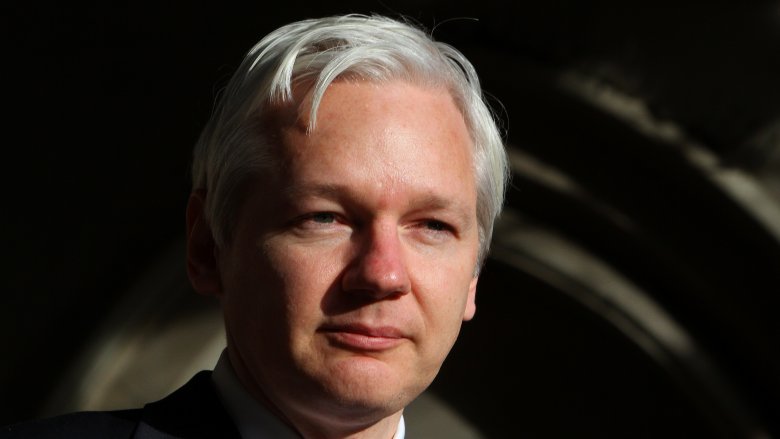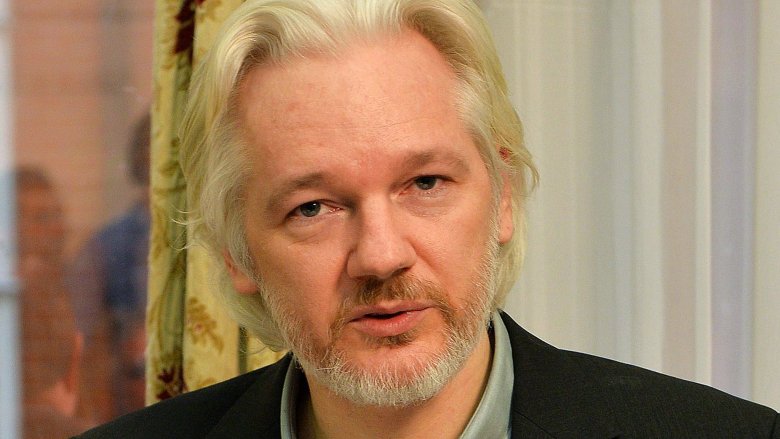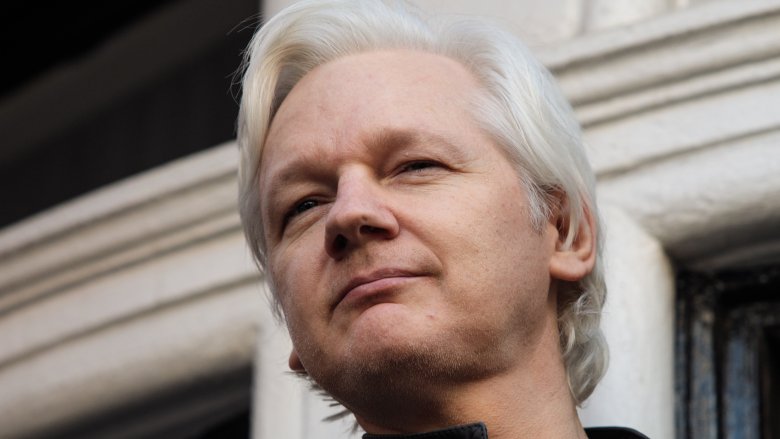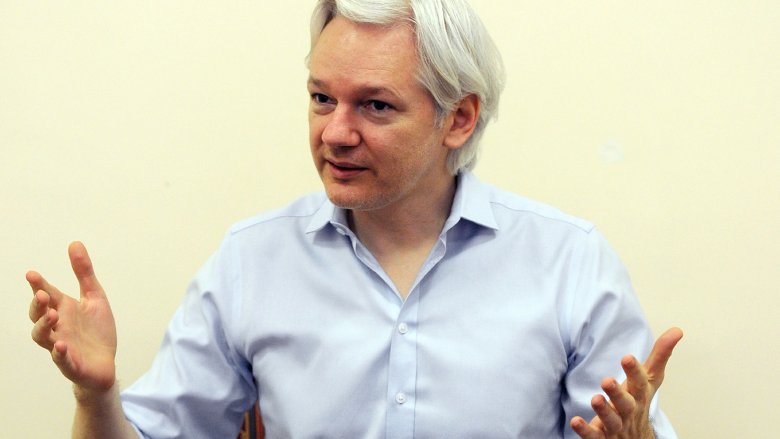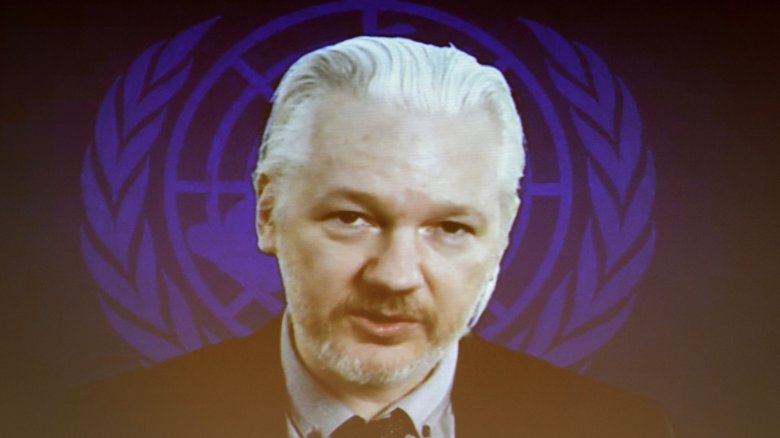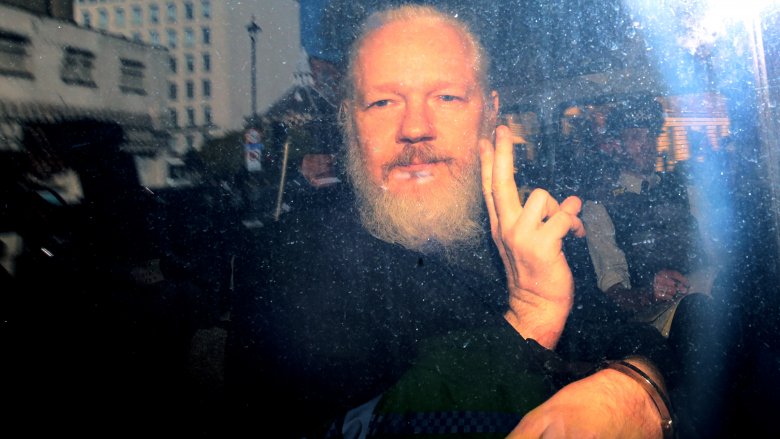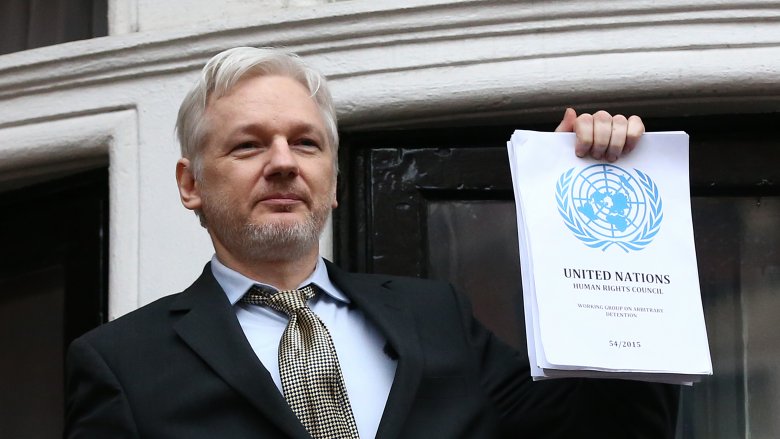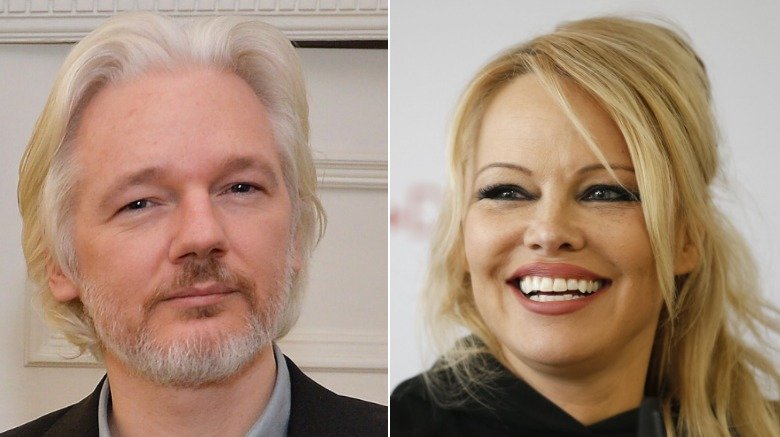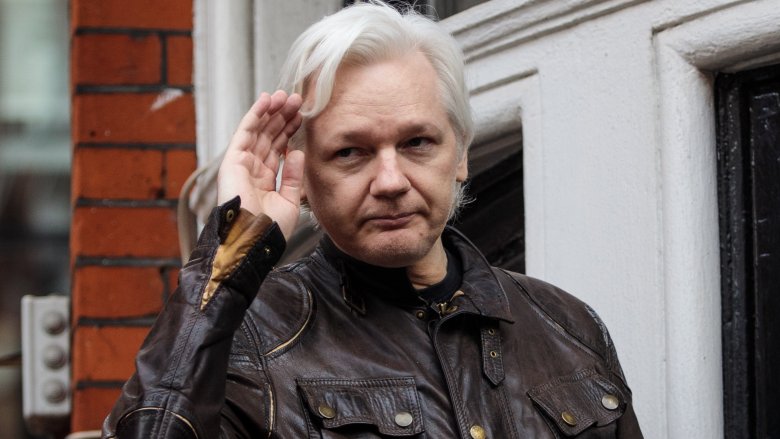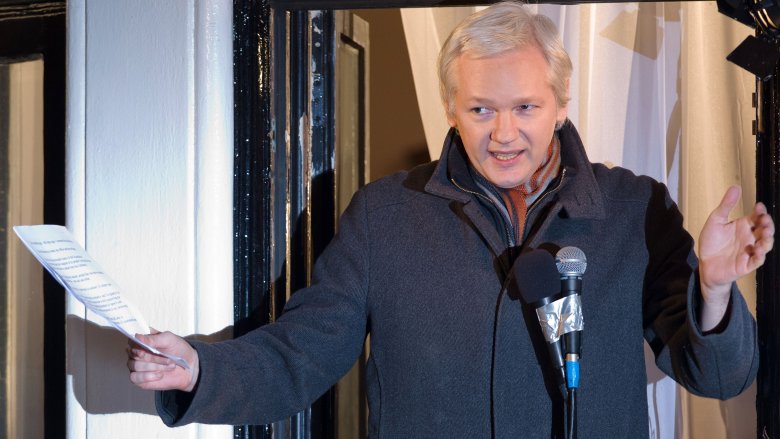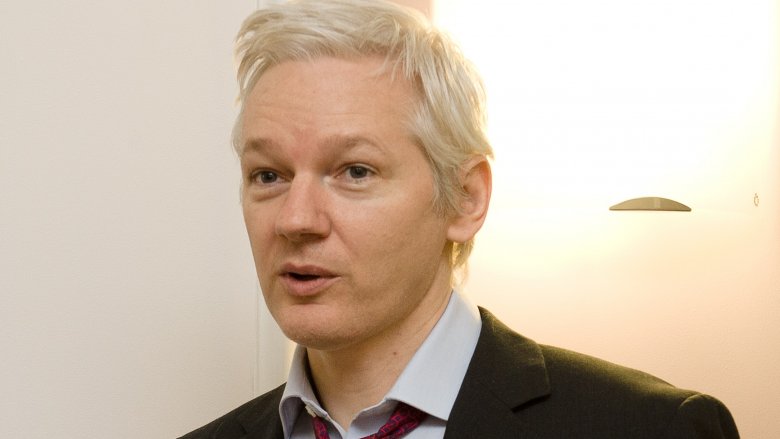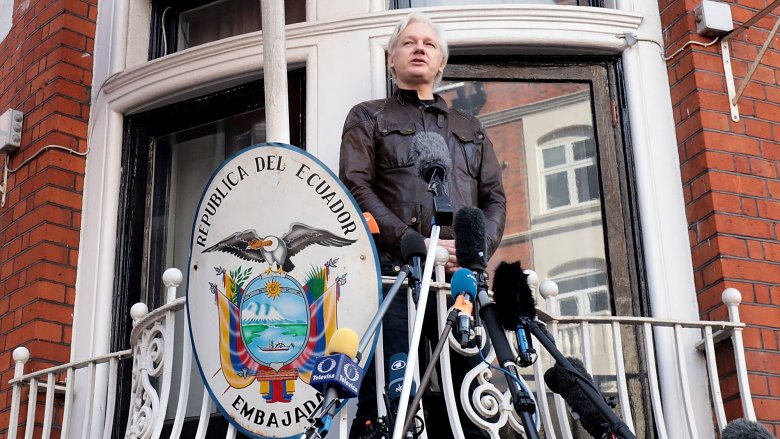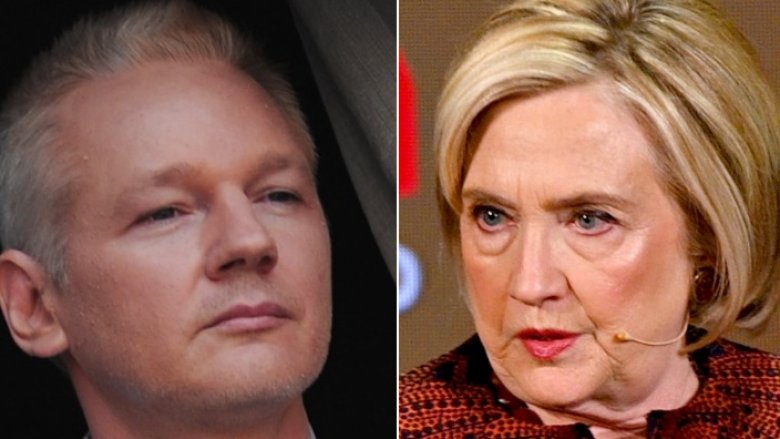The Untold Truth Of Julian Assange
Julian Assange is a bit like Doctor Strange — and not just because Benedict Cumberbatch played both of them in movies. Strange is an arrogant, egotistical wizard who broke the laws of nature to save the world. Assange is an arrogant, egotistical computer whiz who broke the laws of nations on his mission to improve the world. Plus, his life story sounds like fiction. His childhood reads like a cross between a Mark Twain novel and a psychological thriller. In adulthood he used his hacking acumen and high IQ, which is said to be over 170, to hold the powerful accountable for unsavory behavior.
Since founding Wikileaks in 2006, Assange has exposed wholesale corruption in Kenya's government, revealed details of a trade deal that potentially threatens free expression, shined a light on possible war crimes by the U.S., and dropped political bombshells on Hillary Clinton. Since his 2019 arrest, pressing questions have been raised about whether Assange will be prosecuted for airing America's dirty laundry and what that would mean for journalists who leak inconvenient secrets in the future. In addition to being a divisive political figure, he's personally controversial, complicated, and (of course) strange. Here's the untold truth of Julian Assange.
A cult member stalked his family for years
Assange's childhood was a mix of nature and nightmares. As the New Yorker recounted, his mother married a theater director, and together they traveled around Australia producing shows. By the time Assange was 14 he had moved 37 times. Sending him to school was both impractical and unpalatable to his mother, who felt a conventional education would make him too submissive to authority. So Assange was mostly homeschooled and informally educated by university professors.
Young Assange spent a lot of time in the great outdoors. He recalled his boyhood being "pretty Tom Sawyer. I had my own horse. I built my own raft. I went fishing. I was going down mine shafts and tunnels." But his adventurous existence had a dark side. When Assange was 8 his mother split from her husband and began a romance with a musician with whom she later had a child. Unfortunately, the man had another family — specifically The Family, a doomsday cult led by the "cruel and charismatic" Anne Hamilton-Byrne.
Members of The Family gave Hamilton-Byrne their children — 28 in total — as gifts or through fraudulent adoptions. Assange remembered his mother's boyfriend being an abusive, psychologically controlling, and generally "sinister" figure. Amid a custody battle over Assange's brother, his mother decided to flee. Between the ages of 11 and 16 Assange "lived on the run."
The paranoia and personality cult of Julian Assange
As a child Assange was pursued by an abusive musician who belonged to a doomsday cult called The Family and tried to control Assange's family. We don't know the long-term effects, but maybe it explains some of Assange's peculiarities. Per the Guardian, children in The Family had their hair bleached platinum-blond, fueling speculation that the platinum-blond Assange was a member. He has denied this and insisted he didn't bleach or dye his hair. However, the brain beneath that hair was apparently colored by his childhood ordeal.
Assange told the New Yorker that he believed government moles helped his mother's controlling, cult-loving ex-boyfriend track Assange's fleeing family. (The New Yorker noted that his mother told friends her whereabouts and used previous homes as hiding places, which could help explain the "government moles.") Throughout his life Assange would be haunted by the thought of governments secretly monitoring him. Journalist and filmmaker Laura Poitras was given "intimate access to Assange" for a documentary and was struck by his paranoia. He consistently listened for flybots and seemed suspicious of tree branches. Also insanely jealous, he allegedly threatened to fire his girlfriend/employee for hugging a staff member.
Ironically, Assange has been likened to a cult leader because of his controlling behavior and legion of devotees. Wikileaks' internal Twitter chats revealed that some members considered Wikileaks a "dictatorial cult." When Assange addressed Occupy Wall Street protesters in London in 2011, someone literally referred to him as Jesus.
Arab Spring is in the air ... and so are hundreds of fake fiancees
In December 2010, intense civil unrest in Tunisia exploded into a full-blown rebellion thanks in part to a series of U.S. State Department cables released by Wikileaks. The cables highlighted financial shenanigans by the family of Tunisian president and de facto dictator Ben Ali, like the fact that "seemingly half" of the country's business community was tied to Ali through marriage. The uprising caused the president to step down, inspiring citizens in other non-democratic Arab nations to revolt in a phenomenon known as the Arab Spring.
In 2012, Rolling Stone spoke with Assange about the Arab Spring and a separate protest movement it inspired — the Occupy Wall Street demonstrations that spread across the globe. He effectively took credit for both movements, claiming Wikileaks "planned for most of" the upheaval that happened. Admittedly, that's hard to swallow. The Arab Spring resulted in the ouster of one dictator (Ben Ali), the assassination of another (Libya's Muammar Gaddafi), and a devastating civil war in Syria. It would probably take an agent of chaos on the level of Heath Ledger's Joker to craft such an elaborate plan, let alone predict it.
In that same interview Assange bizarrely claimed hundreds of women falsely "thought they were [his] fiancee." Supposedly, these admirers uncovered his remote location and showed up at his door. Dudes allegedly popped up, too, including a seaman calling himself Captain Morgan who sold his boat to devote himself to Assange.
As a teenager he hacked into the Pentagon
Julian Assange has a well-documented history pissing off U.S. officials with embarrassing leaks. Wikileaks likely embarrassed America again when it helped NSA whistleblower Edward Snowden avoid arrest. But Uncle Sam's beef with Assange actually predates Wikileaks by nearly two decades. As a 17-year-old, per Rolling Stone, he hacked into the Pentagon.
In the 1980s a teenage Assange formed a hacking group called the International Subversives and started infiltrating sophisticated computer networks around the world. His internet conquests included the U.S. Department of Defense and the Los Alamos National Laboratory, which built the world's first functional atomic bomb. Assange didn't do this maliciously. According to the New Yorker, the hacking culture he belonged to abided by three main principles: Don't break the computer systems you break into, don't alter system information, and "share information."
Clearly uninterested in Assange's motives, America's government tapped his phone. Eventually he was arrested and charged with 31 hacking offenses. He spent six years in court and became so distraught that he started sleeping in parks. However, after pleading guilty to 25 charges, he only had to pay "a small sum." The Pentagon would later play a key role in Assange's college education — he allegedly dropped out of the University of Melbourne because students were working on Pentagon projects that he presumably didn't want to be a part of.
Bad health and bad behavior at the embassy
Before his unceremonious arrest in April 2019, Assange spent roughly seven years cooped up in London's Ecuadorian embassy. Ecuador granted him asylum amid fears that he would be extradited to Sweden for alleged sex crimes, which Assange claimed were part of a plot — possibly by the Pentagon — to destroy him. Why did Ecuador suddenly stop protecting Assange? He created too many messes both politically and physically.
Some prominent people in powerful countries despised Assange. In 2018 a junior minister in the British Foreign Office called him a "miserable little worm," and a member of the ruling party in the U.K. proposed making things difficult for Ecuador. Meanwhile the Wikileaks founder made things difficult at the embassy. He reportedly smeared poop on walls, damaged the building by skateboarding, verbally abused staff, accused Ecuador of spying on him, and refused to bathe. Furthermore, he used the embassy's internet to interfere in the 2016 U.S. presidential election. When asked to clean up his act, Assange sued the embassy.
The Guardian described Assange as a "troublesome house guest" but he may have had a troubled mind. In 2018 doctors warned that his mental and physical health were in grave danger of deteriorating. He apparently suffered from "a lung problem" and "a shoulder issue." His overall plight was so rough that a UN panel called his embassy stay an "arbitrary detention."
Ecuador wanted to smuggle him in a bag
Julian Assange used a simple ruse to enter Ecuador's embassy undetected in 2012. Posing as a motorcycle courier, he walked up the steps and went inside. Two months later, he officially had asylum. It's not clear if he had an exit plan, but if he did, it certainly didn't involve languishing for seven years and then getting arrested anyway. Ecuadorian officials hatched multiple plans help Assange escape the U.K. before law enforcement could nab him.
One of those plans involved transporting Assange inside a bag. Laugh all you want — surely many have — but it was a serious suggestion that had a surprisingly non-insane rationale behind it. Per the Independent, the idea was inspired by a 1984 case that indicated Assange could be placed in a "diplomatic bag," rendering "British authorities powerless to open it." A less hilarious plan entailed naming Assange an official United Nations representative so he could flee to Ecuador before the U.N. General Assembly revoked his status. A third scenario involved plopping him on a rooftop in some kind of disguise and letting him vanish into a crowd of people. Obviously, none of the options panned out.
His maybe-romantic relationship with Pamela Anderson
When British authorities took Assange into custody, a number of famous folks weighed in. Edward Snowden called it "a dark moment for press freedom," and Pink Floyd's Roger Waters called the U.K. "a satellite state of the U.S." Perhaps the most passionate response came from Pamela Anderson: "How could you UK? Of course — you are America's b*tch." She also had harsh words for Donald Trump, declaring him "a toxic coward of a president" who has "taken the entire world backwards."
Anderson didn't simply lash out; she launched a petition against extraditing Assange to America. She has a dog in this fight because she knows Assange personally ... and maybe biblically. In 2014, she reportedly said she had "definitely a romantic kind of connection" with Assange. In 2018 she changed her tune, telling ABC she "wouldn't call it a romance." Given the lapse in time, both statements could be true. It's also true that Anderson met up with Assange at the Ecuadorian embassy and treated him to a vegan lunch. Maybe she was just being friendly.
His biggest crime might have been embarrassing the U.S.
As is often the case with leakers, Assange has been treated like a cyber boogeyman. In 2010, Vice President Joe Biden painted him as "a high-tech terrorist." In 2019, View host Meghan McCain called him a "cyber terrorist." But what did he actually do to earn that label? As of this writing Assange stands accused of conspiring with former intelligence analyst Chelsea Manning to hack government computers in 2010. Of course, they weren't just hacking for the heck of it. Manning blew the whistle on shocking wrongdoing and deception that occurred during the Iraq War, and Wikileaks published the proof.
Among Manning's most stunning revelations was footage of an American air crew intentionally gunning down a dozen Iraqi civilians, including two Reuters employees, and then laughing about it. Manning also leaked documents showing that the U.S. underreported the war's death toll — more than half of which consisted of civilian casualties — and that Iraqi coalition forces engaged in torture. Moreover, Wikileaks released more than 250,000 diplomatic cables.
The government branded Manning a traitor and charged her with treason, and Assange attained boogeyman status. But official assessments of the damage they did revealed, well, not much. The Pentagon determined that no one died as a result of the leaks. In fact in private, officials characterized the leaks as "embarrassing but not damaging."
Why Wikileaks threatened to sue CNN
Some people have portrayed Assange as a paranoid narcissist who's constantly on the lookout for would-be assassins and slanderers. But paranoia isn't always baseless. For instance, in 2013 an aide to the Canadian prime minister joked about assassinating Assange. And in 2017 a CNN commentator called him something so abhorrent that Wikileaks threatened to sue. Per the Hill, counterterrorism expert Phil Mudd described Assange as a "pedophile who lives in the Ecuadorian embassy in London." Mudd slung that accusation with zero evidence, and CNN admitted as much when it apologized. Wikileaks blamed Mudd's blunder on what looks like an elaborate scheme to slander Assange that was purportedly orchestrated by an obscure dating site called ToddAndClaire.
According to BuzzFeed, ToddAndClaire claimed Assange was under investigation for using a dating app to send disgusting messages to an 8-year-old. To make its allegations look legitimate, ToddAndClare exploited its affiliation with the United Nations Global Compact to give the false impression that the U.N. officially issued a report on illicit activities by Assange. Police denied investigating Assange but confirmed receiving a tip about him. Documents furnished by Wikileaks suggest ToddAndClaire attempted to blackmail Assange and may have been a front company.
It gets weirder. In 2018 a clerical error on a court document seemingly revealed that America planned to charge Assange with crimes and extradite him. That same document referenced an unrelated case involving possible crimes against a child.
His alleged sex crimes in Sweden
If the U.S. has its way, Assange will go down for hacking offenses he committed in 2010. But that's not why he was apprehended in 2019. The arrest actually stemmed from disturbing accusations leveled against him in Sweden.
As the Guardian detailed, in 2010 two women — identified as Miss A and Miss W — told law enforcement that Assange forced himself on them and refused to use protection. Miss A characterized their encounter as violent and said she went along with it because she felt like she couldn't say no. She further alleged that he intentionally ripped his condom after she insisted on him wearing one. Miss W claimed that after a consensual encounter in which Assange begrudgingly wore protection, he waited until she fell asleep and then removed his protection and started up again, without her consent.
Acting on Sweden's behalf, London police arrested Assange in 2010 and later released him on bail. In 2012 the U.K. Supreme Court ruled in favor of extraditing Assange to Sweden for questioning, prompting him to abscond to the Ecuadorian embassy. Assange vehemently denied any wrongdoing and suggested that the Pentagon concocted a scandal to ruin him. Swedish prosecutors dropped the rape investigation in 2017, but he was nonetheless arrested in 2019 for skipping bail. He faces up to 12 months in prison and potential extradition to the U.S.
His secret meeting with a pro-Trump politician
Donald Trump literally said he loved Wikileaks during his 2016 presidential bid but claimed to "know nothing" about Wikileaks after its founder's arrest. He surely loved what Assange's group Wikileaked, though — politically damaging emails from the Clinton campaign that were hacked by Russian operatives. Now that a redacted version of the Mueller report on Russian election meddling has been released, it's clear that the Trump campaign "expected it would benefit electorally from ... Russian efforts," though the Mueller probe didn't establish a criminal conspiracy. What's not clear as of this writing is whether Julian Assange knowingly aided Russia.
One of the keys to resolving the Wikileaks issue may be the very Britishly named Nigel Farage. A former leader of the U.K. Independence Party, Farage avidly supported Trump in 2016. France 24 reported that Trump and Farage got along so well that Trump voiced support for appointing him as Britain's ambassador to America. Farage was also a vocal supporter of Assange. Per Business Insider, back in 2011, he reached out to offer assistance with Assange's legal troubles. Later, when Assange was accused of assisting Russia's election meddling, Farage publicly defended him. Their first known in-person meeting happened in 2017. However, private investigator Glenn Simpson, whose company compiled a controversial Trump dossier, testified that Farage may have visited Assange on other occasions and possibly delivered a thumb drive containing data relevant to the Russian hacking investigation.
Assange's campaign against Hillary Clinton
Hillary Clinton might have more enemies than a post office has stamps. But few — if any — have been as formidable as Julian Assange. Their beef goes back to a series of humiliating leaks that occurred during Clinton's tenure as secretary of state. According to the New York Times, "a quarter-million confidential American diplomatic cables" released by Wikileaks gave "brutally candid views of foreign leaders and frank assessments of nuclear and terrorist threats." Clinton slammed Wikileaks for "[tearing] at the fabric of government" and "sabotaging the peaceful relations between nations."
In 2016 Assange inserted himself into the U.S. presidential race in multiple ways. Per the Intercept, Wikileaks published hacked emails from the Clinton campaign and actively coordinated with Donald Trump Jr. to help Trump win the election. Assange even proposed leaking some of Trump's taxes to hide his bias against Clinton. Assange also encouraged Trump Jr. to push an unsubstantiated rumor that Clinton recommended killing Assange with a drone strike.
Obviously, Assange wasn't the biggest election meddler. Those Wikileaked emails were hacked by Russian operatives working to undermine Clinton. Understandably suspicious and justifiably pissed, Clinton called Assange "a tool of the Russian government." Assange shot back, calling her cold and creepy. Whether or not he conspired with Russia, both had the same goal — to keep Clinton out of the White House and put Trump in it.
